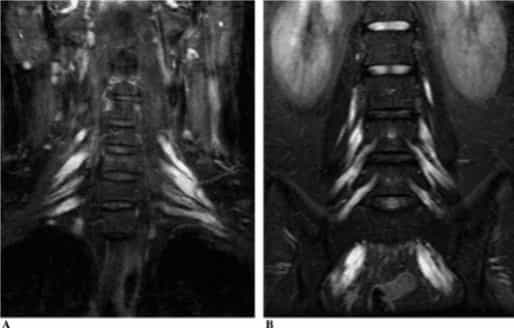CIDP & Spinal Roots,
Search Cidpusa webChronic inflammatory demyelinating polyradiculoneuropathy (CIDP) with hypertrophic spinal radiculopathy mimicking neurofibromatosis
 NEW YORK (Reuters Health) - Recent study findings suggest that
Neurofibromatosis may be misdiagnosed and in reality is CIDP
NEW YORK (Reuters Health) - Recent study findings suggest that
Neurofibromatosis may be misdiagnosed and in reality is CIDPAuthors
P. Pytel, K. Rezania, B. Soliven, J. Frank, R. Wollmann Department of Pathology, MC 6106, University of Chicago Hospitals, 5841 S Maryland Ave., Chicago, IL 60637, USA
Department of Neurology, University of Chicago, Chicago, USA
Abstract
This report illustrates a case of chronic inflammatory demyelinating polyradiculoneuropathy (CIDP) masquerading as neurofibromatosis due to multifocal
enlargements of spinal nerve roots.
The patient initially complained of intermittent
numbness of the hands and leg weakness at age 62.
Nerve conduction velocities
were reported to be abnormally slow, suggesting a diagnosis of demyelinating neuropathy.
A complaint of progressive lower back pain 4 years later prompted a
lumbar CT myelogram, which demonstrated bilateral nerve root enlargements.
A
biopsy of an enlarged lumbar root obtained during decompressive laminectomy was
interpreted as consistent with a plexiform neurofibroma.
He suffered recurrent
paraparesis, at times with a sensory level indicating spinal cord compression, which
responded to corticosteroid therapy. An autopsy 15 years after the onset of symptoms
revealed hypertrophic radiculopathy and peripheral neuropathy due to CIDP with no
evidence of neurofibromatosis.
This case illustrates how the hypertrophic neuropathy accompanying CIDP can be mistaken for neurofibromatosis.
Keywords Chronic inflammatory demyelinating polyneuropathy, Neurofibromatosis, Hypertrophic neuropathy
About 23 million persons, or 10 percent of the U.S. population, have one or more chronic disorders of the musculoskeletal system.
Trigger points are discrete, focal, hyperirritable spots located in a taut band of skeletal muscle. The spots are painful on compression and can produce referred pain, referred tenderness, motor dysfunction, and autonomic phenomena.
At home if you want to get rid of this pain rub ice over the painful point and then stretch that area. If its the knee move the leg up and down, if its the neck stretch from side to side.
See the electronic section for stimulation and getting rid of this problem forever you can purchase aTens unit for $15 .
Massaging with any oil like olive oil, walnut oil ,sesame seed oil will also get rid of this pain.
Turmeric powder mixed in a glass of water one eight of a tea spoon in a cup of milk will get rid of these pain if taken daily for a month.